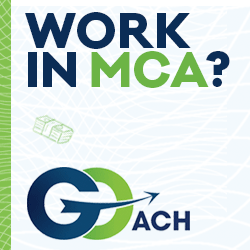Results 1 to 19 of 19
-
06-17-2015, 01:56 PM #1Senior Member











 Reputation points: 23702
Reputation points: 23702
- Join Date
- Jul 2014
- Posts
- 1,746
We haven't even scratched the scratch of the surface...
I read this a while back somewhere regarding the working cap market (may have been DeBanked). Anyway, I understand On Deck does about 1000 new loan originations a month (excluding renewals). With 3-4 million eligible businesses out there in the US that could potentially qualify for this product, 12K new customers a year, for someone with On Deck's reach, seems like nothing. We are a generally small operation with no plans to expand, but so many of my competitors are betting huge with new state of the art offices and plans to hire 30, 40, 50 new sales reps to push these loans.
Smart? Foolish? Are we at the apex, on the ascent, or descending out of a bubble? I'd like to hear some thoughts on this. Thanks.
-
06-17-2015, 02:27 PM #2
i dont know where in the growth line we are exactly but I can tell you it is not the apex.. For companies that have been around a while they remember the time before ACH deals when everything was on a split. Banks wanted to put out more money expand market share so they started doing ach deals. After that, industries that a few years ago could not be touched started getting funded (construction, trucking, homebased). When growth starts to plateau again, banks will find new ways to expand market share. As long as Ondeck, MCC, CAN, and the rest of the big boys continue to want to grow they will find ways to expand the market, and the smaller companies will follow in order to still compete.. Just my opinion
Last edited by J.Celifarco; 06-17-2015 at 02:30 PM.
John Celifarco
Managing Partner
Horizon Funding Group
3423 Ave S
Brooklyn, NY 11234
T: (347) 773-3990 | F: (718) 795-1990
Linkedin: Profile
Email: john@horizonfundinggroup.com
-
06-17-2015, 02:47 PM #3Senior Member











 Reputation points: 99426
Reputation points: 99426
- Join Date
- Sep 2012
- Location
- New York, NY
- Posts
- 1,780
I have a feeling we're at the apex. There are tons of new sales offices opening up chasing the same lead sources. Stock prices for ONDK and LC are near their all time lows. Lots of new money is pouring into an industry that's already been around for almost a decade. When all the dumb money enters the market, that's when the smart money looks to exit. Just my two cents...
Last edited by MCNetwork; 06-17-2015 at 02:51 PM.
-
06-17-2015, 02:55 PM #4
yeah that is all true, but you dont think all the new iso's and banks will fizzle out leaving marketshare for the rest of us that actually know what we are doing. I dont see how these companies whos entire business model is based on stacking can last. New deal commissions are too low because they are smaller deals and bad debt too high to have any kind or renewal portfolio
John Celifarco
Managing Partner
Horizon Funding Group
3423 Ave S
Brooklyn, NY 11234
T: (347) 773-3990 | F: (718) 795-1990
Linkedin: Profile
Email: john@horizonfundinggroup.com
-
06-17-2015, 04:09 PM #5jotucker1983Guest
I wanted to chime in here with my opinions.
In terms of the US Market solely, I think our market is at or getting close to the Apex which should be between $2 billion - $5 billion annual volume. Now when I say this, I'm only referring to the Merchant Cash Advance and Alternative Business Loan products.
There's 28 million small businesses in the US Market, but only about 4 million of these businesses qualify from a generic standpoint for the MCA or the Alt. Business Loan. These 4 million listings make up the generic market, but they are not the real market. The real market are those listings that not just qualify, but would entertain the product's usage.
Most of the 4 million companies are well capitalized and would never consider a product with this level of cost. If I were a betting person, I would say that of that 4 million chunk, you only have 400,000 or about 10% of the generic market that would even discuss using the product. These 400,000 companies I would say in general, might not be "under-capitalized" but they are not "significantly capitalized." By not being significantly capitalized, it just becomes a timing game of contacting them right when they are going through an "event" such as expansions, seasonal periods, having to replace equipment, needing to hiring more people, etc., and then offering the product as a solution. From there, I would say that about 25% of them would consider entertaining the product/sending an application, which is about 100,000 of the 400,000 listings.
So I think we are fighting over the business of about 100,000 companies who are not significantly capitalized, who randomly get into situations of needing capital for various reasons, and who will entertain our product over other options.
To expand the real market we would have to reduce the cost of the product while at the same time extending the term of the product. While that could possibly happen, I really don't see how the rates in general can go lower than your 1.09 - 1.14 for 6 months and 1.20 - 1.25 for 12 months. I don't know how you in general, price lower than this range.
With that being said, I believe the Future going forward is going to be totally in the hands of the larger players in the industry, the small broker shops are going to be phased out due to low profits. The big boys are going to swallow up all of the quality marketing channels through SEO, Strategic Partnerships, and having their own internal sales team.Last edited by jotucker1983; 06-17-2015 at 04:17 PM.
-
06-17-2015, 04:43 PM #6Senior Member











 Reputation points: 99426
Reputation points: 99426
- Join Date
- Sep 2012
- Location
- New York, NY
- Posts
- 1,780
The cash advance market is much larger than 100,000 companies. The top 3 funders have already collectively funded more than this amount already. Of the 4 million businesses that qualify for a cash advance, a large majority will encounter situations where a cash advance makes sense. The ones that would never touch a cash advance are the well capitalized Fortune 1000 type companies. But keep in mind that 80% of all restaurants fail within 5 years. This market alone can yield many opportunities for a cash advance. It's just a matter of timing and reaching the merchant when he is in need of capital.
-
06-17-2015, 05:19 PM #7Senior Member











 Reputation points: 23702
Reputation points: 23702
- Join Date
- Jul 2014
- Posts
- 1,746
All really great thoughts. John's comment makes me want to pack my bags, though.
 If we are truly all fighting over the same 400,000 clients, we are all truly in big trouble. I know a few larger ISO's in the industry that spend copious amounts of money on marketing, and only pull in about 1000 applications a month. Half are qualified, half of those get sold, half of those actually get approved on the terms they get sold on, and half of the remaining actually fund. The default rate is high.
If we are truly all fighting over the same 400,000 clients, we are all truly in big trouble. I know a few larger ISO's in the industry that spend copious amounts of money on marketing, and only pull in about 1000 applications a month. Half are qualified, half of those get sold, half of those actually get approved on the terms they get sold on, and half of the remaining actually fund. The default rate is high.
What is bothersome a bit is that the market seems to be so crowded now, with the same message going out to everyone. Business owners are over-marketed to as there are zero barriers to entry to the alt finance market.
I do agree that the day of the little closet ISO is rapidly going away, and only the strong (or well capitalized ISO's) will survive.
-
06-17-2015, 05:29 PM #8Senior Member











 Reputation points: 2463
Reputation points: 2463
- Join Date
- Sep 2012
- Location
- Gainesville Florida
- Posts
- 167
This industry is at a plateau for new ideas and innovation, which I blame stacking for... as new comers to the space don't really have to look for a way to attract new business or have something that sets them apart. I personally believe that just like the processing companies who compete on price everyday... this industry will start looking for value adds to bring on new merchants and help retain them.
-
06-17-2015, 06:21 PM #9Member











 Reputation points: 3410
Reputation points: 3410
- Join Date
- Aug 2014
- Posts
- 72
I don't agree that only large ISO shops are going to survive. If the industry capitulates or the economy shrinks, those large ISOs are going to look a lot like small ISOs.
I think a small ISO can carve out his piece of the pie if he grows cautiously and diversifies.
I have a great fear for funders doing long term deals. What's going to happen to those 15 month terms if the economy goes soft again? They are too expensive for borrowers to afford and not long enough to make them affordable.
-
06-17-2015, 06:40 PM #10
If we see interest rates go up and the economy start to shrink...those long term deals will go away and the deal will get shorter and factor rates will go up.
So all these reps out here better start learning how to actually sell these programs and help merchants understand the difference between what they want....and what they qualify for
-
06-18-2015, 09:51 AM #11Senior Member











 Reputation points: 16720
Reputation points: 16720
- Join Date
- Sep 2014
- Posts
- 430
If you think this industry is growing this fast, with so much money pouring in, because folks are itching to sell MCAs, you've got another thing coming. The future of this space isn't MCAs, it is data. It is scoring. It is observations. It is historical performance. It is finding the latest, greatest, data source that nobody else has. It is learning how to make better credit decisions with less paperwork and less hassle. The growth potential here isn't who can capture the majority of those 100k businesses, it is who can bring technology and data and credit expertise to bear to not just deliver MCAs faster, but to deliver capital to merchants at a cost and speed that rivals traditional banks. The big boys aren't competing against YSC or Quickbridge or anybody beneath them. They have their eyes set on competing with Wells Fargo, M&T, SunTrust and other chartered SBA lenders.
The upside demand in the multi-billions that people tout is with market expansion in mind. As data, scoring, etc. get better it will be possible to reduce cost and extend term. You see a price floor because you can't see how powerful all the lending observations companies like CAN and OnDeck and MCC and Rapid are in making this a reality. Someone on here posted that OnDeck is now going out to 24 months. Just a few years back that would have been unheard of without people thinking they were nuts, but they are able to do it because they have LOTS of data and LOTS of observations. CAN has been recording data and observations for almost 2 decades. Their scoring is very robust. Not only their at origination scoring, but also their probability of default and loss given default models.
Market smarter, convert faster, collect better. Earn the yield on both ends. Too many folks in this space are trying to acquire as cheap as possible, price as high as possible, write off what goes bad, and keep whatever is leftover. Those are the folks that will wash out.
-
06-18-2015, 10:15 AM #12jotucker1983Guest
I think this is a great discussion. Some of you guys have mentioned that you believe the real market is much larger than 100k companies because the top 3 funders have already funded more than 100k companies, and this is true. But let's break down those numbers more closely, let's just look at Can Capital, On Deck Capital and Merchant Cash and Capital:
> CAN: 156,000 businesses funded, $5 billion volume, since 1998
> ODC: 30,000 businesses, $2 billion volume, since 2007
> MCC: 20,000 businesses funded, $1 billion volume, since 2005
- That's over 200,000 businesses just from these three, not counting others like Rapid, Strategic, Kabbage, BFS, etc.
- But how many of these 200,000 companies are unique listings? In other words, how many of these companies took out 2 or 3 advances from 2 or 3 companies, which from a market standpoint would "count" them as new deals but they are in fact the same companies being recycled?
- Plus, it took on average of just over 11 years (if you add up the existence of the three companies and divide by three) to get to 200,000 funded.
When I say that the real market is 100,000 I believe that's based on again, the generic market being at 4 million, with 10% considering (400k), and 25% of that amount actually entertaining by sending an app (100k). To break it down further, of that 100,000 real market that sends an app, how many actually get approved/funded? Maybe 30% - 60%?
So can we say that once the industry as a whole gets to funding 30,000 - 60,000 businesses on an annualized basis, that's going to be pretty much the top? I believe we are there now. Considering the average MCA is about $25,000 - $40,000 then this would be annualized volume of $750 million to $2.4 billion. This is going to be the top of the US Market (in my opinion) unless structural changes occur such as:
- Lowering of cost and extending of terms, which I don't think will happen. (Note, this will also cause companies like Lending Club to take business away from our market because they are doing this right now, while our industry is not)
- More players in the generic market which increases the real market. So if we go from 4 million to 10 million small businesses, we now have 1 million that would consider and 250,000 that would entertain (send an application). 30% - 60% would approve/fund leading to 75,000 to 150,000 with annualized volume of about $1.9 billion to $6 billion.
-
06-18-2015, 10:32 AM #13jotucker1983Guest
I totally agree with you in the value of the data and underwriting systems being developed, which provides more potential market opportunities for growth. But again, aren't those really going to be opportunities only for the big boys? The small broker shops really can't take advantage of those opportunities as they (most of them) don't have their own systems.
Do you believe that the big boys are looking to eventually integrate with the conventional sources like a Wells Fargo, or do you believe they want to compete with them? I can see integration (goes back to the Strategic Partnerships I was discussing), but I'm not sure if they can compete directly?
I can imagine walking into my local Credit Union or small Community Bank in a couple of months and seeing ads for a "Business Cash Advance". I can also see the Loan Officer reselling the product if I don't qualify for business financing offered by the Credit Union for example.
-
06-18-2015, 10:45 AM #14Member











 Reputation points: 3410
Reputation points: 3410
- Join Date
- Aug 2014
- Posts
- 72
The point is John, that what we know as a "merchant cash advance" isn't where the future is headed. We are an alternative right now but that's going to shift as lenders get comfortable and better understand risk. MCC, ODC and the Rapid's of the world will compete with SBA and other bank like products.
MCA and other alternative platforms are still just a fraction of the small business lending environment. Capital is going to become cheaper for merchants, defaults will decrease and the costs of funding these loans will also decrease. This also means much lower compensation for ISO's. Guys living off of 12 point commissions are going to find a much smaller pond to fish in.
-
06-18-2015, 11:02 AM #15Senior Member











 Reputation points: 16720
Reputation points: 16720
- Join Date
- Sep 2014
- Posts
- 430
-
06-18-2015, 11:40 AM #16Senior Member











 Reputation points: 54977
Reputation points: 54977
- Join Date
- Dec 2013
- Posts
- 4,713
Ill start by saying if you put 60,000 Business owners in a sports stadium and said who ever heard of MCC? On Deck? please pick up your hands VERY FEW hands will go up!...now that's very important and good news for every broker contacting merchants and here is why!!..you will notice next time your in the SUPERMARKET that you will find only 2-3 Ketchup Companies then go walk over to the Soy-Milk section and you will find a wall of 20 plus brands! the reason is anytime a company cant carve them-self as the Heinz of Ketchup and no one can identify a player it allows many players to come to the table. (hence 30 soy milks vs 2 ketchup's).
So my point is, when Jimmy the sole owner (and ZERO employees) of United Funding America (example) calls Timothy's Towing (90K in monthly sales) he has the same brand recognition as MCC /Snap/Ondeck/Rapid/retail/etc/ because of that FACT the funding companies will ALWAYS be at the mercy of the guys on the phones with merchants....
(just BTW for the same reason the credit card processors share BILLIONS in revenues per month to foot-soldiers on the street that signed-up merchants because of the same 2 facts, 1. No processor had real real brand recognition (for sheilas bakery) , and therefore 2. the processors were at the mercy of the foot-soldiers and have no choice but to give them an enormous monthly split.Last edited by mcaguru; 06-18-2015 at 11:46 AM.
-
06-18-2015, 11:50 AM #17
that is true to an extent but is changing and will continue to change as these companies continue to do commercials name recognition is going to become more and more important. It will make getting deals done with banks that people dont know or have never heard of more difficult then it already is. F
John Celifarco
Managing Partner
Horizon Funding Group
3423 Ave S
Brooklyn, NY 11234
T: (347) 773-3990 | F: (718) 795-1990
Linkedin: Profile
Email: john@horizonfundinggroup.com
-
06-18-2015, 12:19 PM #18jotucker1983Guest
Miller and Credit Guy,
Got it, here are some of my questions to you guys:
- You guys are predicting that the product will eventually change from an alternative to being one of the "standards," my question is how can that happen if we are staying in the context of a Receivable Purchase? Considering the advanced analytics and underwriting systems, how do you think the likes of Can, MCC, etc. can eventually come down low enough (and extend the payback long enough) to compete with a conventional loan, as despite the advanced data, aren't the risks of lending to a small business in this fashion (with a lack of tangible asset collateral or certain levels of profitability, etc.) still present?
- Or, do you think that Can, MCC, etc. will eventually begin offering what are known as conventional loans, with very similar terms/structures as let's say a Wells Fargo? If that's the case, surely the underwriting criteria on those loans would resemble the same as a Wells Fargo Conventional Loan, correct? So wouldn't that still slam out a good amount of applicants from the approval pile?
This is a great analogy, where I disagree though is that I believe you are in some ways, comparing apples to oranges, or comparing a conventional product to an alternative one.
Going back to the 28 million small businesses in the US stat, for credit card processing you might have about 10 million of those businesses that represent the "real market". Those 10 million businesses have no choice but to accept payment processing and pay interchange fees, because a significant portion (if not all) of their customer base demands the availability of the payment option. Because of the large scope and quantity, as well as due to the requirement of having the service to operate, Credit Card Processing is very much a conventional product, not an alternative one. This means that if you stood up in a room and asked a group of business owners what a "Merchant Account" was, they would all be able to tell you.
Compare this to the MCA, which is not an operational requirement across the board and only plays an alternative role to the conventional term loan/line of credit products. Fewer businesses use the product because fewer businesses have to use it, as most businesses are capitalized through conventional sources. This is very similar to the A/R Factoring product, which has been around for hundreds of years. Stand up in a room and ask a group of business owners what a "Merchant Cash Advance" is, a good amount of them still today will not know what it is, just like a good amount of them today still don't know what A/R Factoring is even though it's been around for hundreds of years. The reason is because the products are alternatives to the conventional market, and "alternatives" are usually never as popular as the "standards".
With that being said, I'm not sure if the lack of popularity is a direct correlation to a wide open market opportunity? But these are just my opinions, I'm in no means suggesting that I have all of the answers, but I think this is a great discussion.Last edited by jotucker1983; 06-18-2015 at 12:23 PM.
-
06-18-2015, 12:58 PM #19Member











 Reputation points: 3410
Reputation points: 3410
- Join Date
- Aug 2014
- Posts
- 72
Definitely a good discussion.
John, I liken this industry to what occurred with Wall Street brokerage houses in the late 90's. When the ETrades and Charles Schwab's of the world rolled out their online trading platform, everyone predicted that this was going to be the end of the financial advisor/stock broker.
Trade commission and trade costs fell through the floor. Many firms like Morgan Stanley and Merrill Lynch rolled out online trading programs to compete with these new online brokers.
Brokerage houses differentiated themselves by promoting their advice and personal relationship vs a cheap trade price. Now, there is a very fine line between a Charles Schwab and Merrill Lynch, if there is even a line at all. All the online platforms now function as a full-service investment firm.
I think something similar will happen here. Money will get cheaper for borrowers and the gap that exists between a bank loan vs a CAN Capital loan will become much more narrow. I want to be clear here and point out that the MCA product won't be the same as we know it either. I don't know what it will look like but I'm willing to bet that it's going to become attractive enough for well capitalized businesses to consider leaving their bank for it.
I do believe there will always be an appetite for the high risk deal. I am concerned at what future pricing looks like for those high risk deals however.


 Reply With Quote
Reply With Quote


















